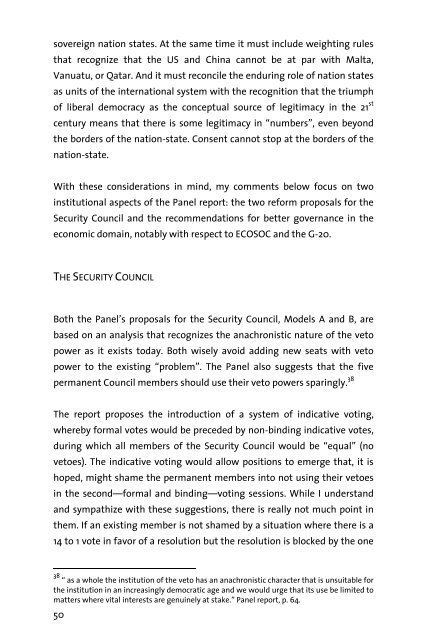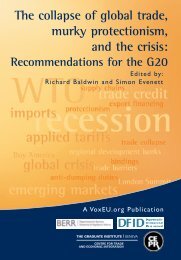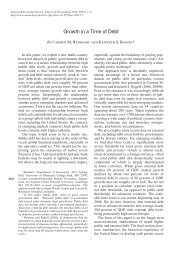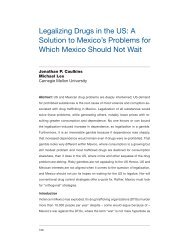Reforming the United Nations for Peace and Security
Reforming the United Nations for Peace and Security
Reforming the United Nations for Peace and Security
You also want an ePaper? Increase the reach of your titles
YUMPU automatically turns print PDFs into web optimized ePapers that Google loves.
sovereign nation states. At <strong>the</strong> same time it must include weighting rulesthat recognize that <strong>the</strong> US <strong>and</strong> China cannot be at par with Malta,Vanuatu, or Qatar. And it must reconcile <strong>the</strong> enduring role of nation statesas units of <strong>the</strong> international system with <strong>the</strong> recognition that <strong>the</strong> triumphof liberal democracy as <strong>the</strong> conceptual source of legitimacy in <strong>the</strong> 21 stcentury means that <strong>the</strong>re is some legitimacy in “numbers”, even beyond<strong>the</strong> borders of <strong>the</strong> nation-state. Consent cannot stop at <strong>the</strong> borders of <strong>the</strong>nation-state.With <strong>the</strong>se considerations in mind, my comments below focus on twoinstitutional aspects of <strong>the</strong> Panel report: <strong>the</strong> two re<strong>for</strong>m proposals <strong>for</strong> <strong>the</strong><strong>Security</strong> Council <strong>and</strong> <strong>the</strong> recommendations <strong>for</strong> better governance in <strong>the</strong>economic domain, notably with respect to ECOSOC <strong>and</strong> <strong>the</strong> G-20.THE SECURITY COUNCILBoth <strong>the</strong> Panel’s proposals <strong>for</strong> <strong>the</strong> <strong>Security</strong> Council, Models A <strong>and</strong> B, arebased on an analysis that recognizes <strong>the</strong> anachronistic nature of <strong>the</strong> vetopower as it exists today. Both wisely avoid adding new seats with vetopower to <strong>the</strong> existing “problem”. The Panel also suggests that <strong>the</strong> fivepermanent Council members should use <strong>the</strong>ir veto powers sparingly. 38The report proposes <strong>the</strong> introduction of a system of indicative voting,whereby <strong>for</strong>mal votes would be preceded by non-binding indicative votes,during which all members of <strong>the</strong> <strong>Security</strong> Council would be “equal” (novetoes). The indicative voting would allow positions to emerge that, it ishoped, might shame <strong>the</strong> permanent members into not using <strong>the</strong>ir vetoesin <strong>the</strong> second—<strong>for</strong>mal <strong>and</strong> binding—voting sessions. While I underst<strong>and</strong><strong>and</strong> sympathize with <strong>the</strong>se suggestions, <strong>the</strong>re is really not much point in<strong>the</strong>m. If an existing member is not shamed by a situation where <strong>the</strong>re is a14 to 1 vote in favor of a resolution but <strong>the</strong> resolution is blocked by <strong>the</strong> one38 “ as a whole <strong>the</strong> institution of <strong>the</strong> veto has an anachronistic character that is unsuitable <strong>for</strong><strong>the</strong> institution in an increasingly democratic age <strong>and</strong> we would urge that its use be limited tomatters where vital interests are genuinely at stake.” Panel report, p. 64.50





